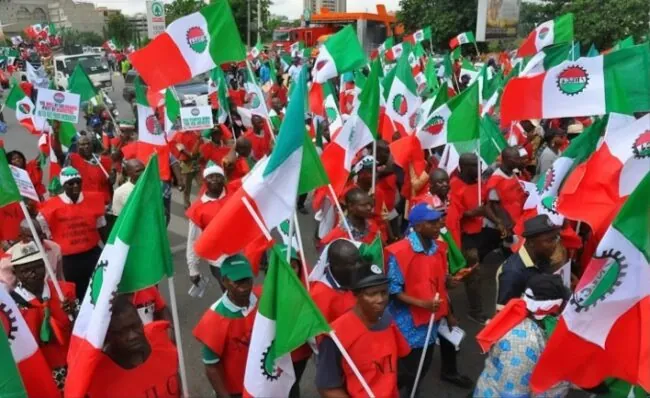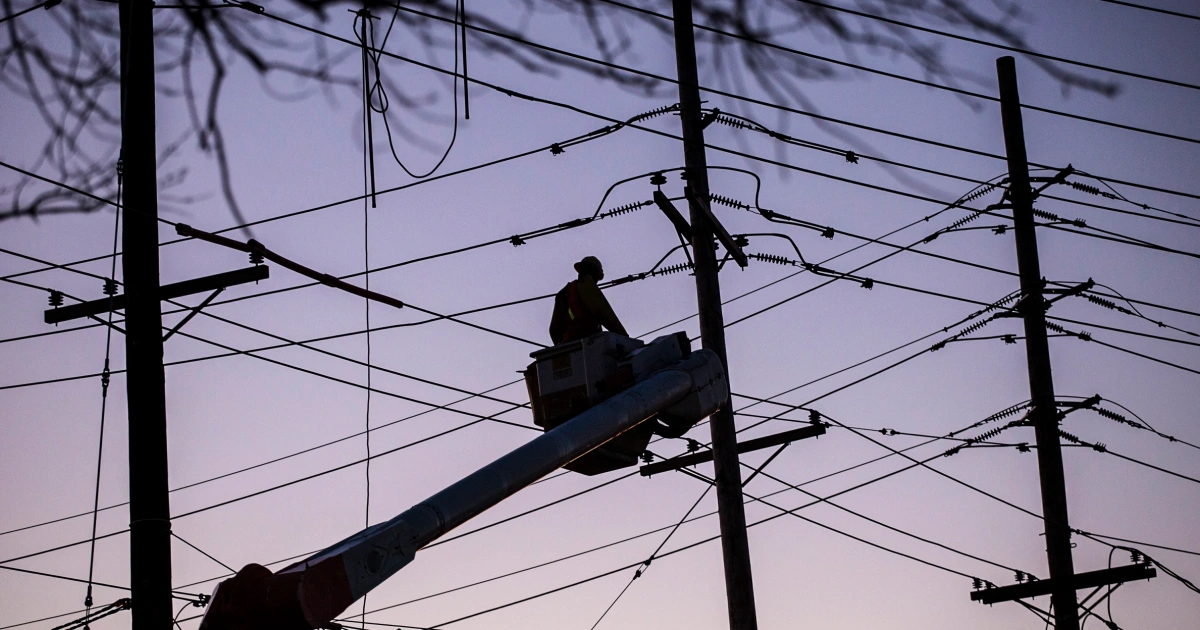By Christian Appolos and Sunday Ejike
Copyright tribuneonlineng

Court stops PENGASSAN, others from cutting gas supply to Dangote Refinery
• FG meets PENGASSAN, Dangote
The dispute between the Petroleum and Natural Gas Senior Staff Association (PENGASSAN) and the Dangote Group has escalated as the Nigeria Labour Congress (NLC) has directed all its affiliates and members nationwide to immediately mobilise for what it described as a “full-scale, decisive engagement” against the conglomerate’s alleged anti-worker practices.
NLC’s directive, contained in an internal memo signed by its president, Comrade Joe Ajaero, follows months of industrial unrest led by PENGASSAN and the Nigeria Union of Petroleum and Natural Gas Workers (NUPENG).
The two unions have accused the Dangote Group of union-busting, unfair labour practices, and victimisation of workers at the Dangote Petroleum Refinery and other subsidiaries.
According to the NLC, the conflict has now moved beyond the individual struggles of PENGASSAN and NUPENG, and has become a broader fight for workers’ rights across the country.
“This letter serves as a formal and urgent request in response to the protracted and deliberate anti-worker crusade being waged by the Dangote Group against the Nigerian working class,” Ajaero wrote in the memo.
“The ongoing battle with PENGASSAN and NUPENG is merely a symptom of a deeper sickness, a capitalist pathology of union-busting, worker enslavement, and gross impunity that defines the Group’s industrial relations strategy.”
The NLC further accused the Dangote Group of behaving like “a state within a state,” alleging that the company had repeatedly violated Section 40 of the Nigerian Constitution, flouted International Labour Organisation (ILO) Conventions 87 and 98, and treated national labour laws with “utter disdain.”
Ajaero described the company’s operations as sites of exploitation rather than legitimate workplaces.
“Their facilities are not workplaces but plantations of exploitation, where the dignity of the worker is systematically crushed to maximise profit for the few,” he declared.
“The time for pleading and endless, fruitless dialogue is over. The moment for decisive, collective action is now,” he said.
Declaring the start of a new phase of confrontation, the NLC placed all its affiliates on immediate and full alert. Ajaero instructed unions to launch a comprehensive unionisation drive targeting every Dangote facility in the country, calling it a “strategic priority.”
“You are requested to commence, with immediate effect, preparation for a vigorous and comprehensive unionisation of all workers within every Dangote Group facility falling under your jurisdiction,” the memo read.
The congress further ordered the establishment of Action Mobilisation Committees in every affiliate union. These committees are to engage directly with the NLC National Secretariat within 72 hours to harmonise strategy, logistics, and communications.
Ajaero emphasised that the ultimate goal of the campaign is to force the conglomerate to respect workers’ fundamental rights.
“This action aims to compel the Dangote Group to unconditionally respect the right of every worker to freely join a union of their choice, cease all forms of intimidation and union-busting activities, and submit to the authority of our nation’s labour laws and institutions,” he said.
NLC also accused the Dangote Group of leveraging its economic power to escape regulatory oversight and accountability, alleging that key government agencies have been compromised.
“The impunity of the Dangote Group must be met with the resistance of organised labour,” Ajaero asserted.
“No amount of media propaganda or paid hirelings will stop us from fighting for our liberty in the face of apparent regulatory capture, where the state seems to have abdicated its responsibility to hold this behemoth accountable.”
Court stops PENGASSAN, others from cutting gas supply to Dangote Refinery
This was just as Justice Emmanuel Danjuma Subilim of the National Industrial Court sitting in Abuja on Monday restrained PENGASSAN from embarking on its planned industrial action against Dangote Petroleum Refinery and Petrochemicals FZE.
Justice Subilim, in a ruling on an ex-parte application filed by Dangote Refinery on Monday, specifically restrained the Nigeria National Petroleum Company Ltd (NNPCL), Nigeria Midstream and Downstream Petroleum, and the Nigeria Upstream Petroleum Regulatory Commission, who are defendants in the suit, from cutting crude and gas supply to Dangote Refinery.
George Ibrahim, SAN, from Ogwu James Onoja law firm in Abuja, argued the application on behalf of the plaintiff and secured the order against the defendants.
The senior lawyer in the ex-parte motion applied for an order of interim injunction restraining the 1st defendant, its members, agents, servants, privies, representatives, assigns or whatsoever and howsoever called from calling or directing the halt of crude and gas supply to the claimant under any guise and/or embarking on any industrial action against the claimant with a view to crippling, blocking roads, or obstructing the flow of vehicular movement, shutting down operations of the claimant or licensees of the 2nd to 4th defendants named in the 1st defendant directives dated September 26, 2025, or by any means frustrating the businesses/activities of the claimant/applicant pending the hearing and determination of the Motion on Notice.
He applied for “an order of interim injunction restraining the 2nd–4th defendants, their employees, members, agents, servants, privies, representatives, licensees, assigns or whatsoever and howsoever called from giving effect to the directives of the 1st defendant to halt the supply of crude and gas to the claimant or joining, continuing, embarking on, or in any manner participating in the planned industrial action of the 1st defendant and its affiliates and cronies or any other strike whatsoever against the claimant/applicant with a view to frustrating her businesses and operations pending the hearing and determination of the Motion on Notice.”
Ibrahim argued that the applicant is a petroleum production and/or distribution company licensed to own, operate and produce petroleum and petrochemical products for the general consumption of the Nigerian public, and whose business provides essential services to the Nigerian economy and the general public.
He said, in recent times, there have been incidents of sabotage by some employees of the claimant at the claimant’s plant which sprang up issues of grave health concern and safety of human lives.
According to him, the management of the claimant came to an irresistible conclusion that there should be reorganisation in the plant which led to relieving some of its staff of their employment, and same was communicated to all staff by a memo or circular dated 25th September, 2025.
The senior lawyer said, in the early hours of Friday, the 26th day of September 2025, the claimant received online reports that Nigerian workers were laid off by the claimant because they joined the 1st defendant’s union.
According to him, the management of the claimant by a press statement refuted the said report and explained in clear terms that the claimant was not averse to its members unionising as that is their constitutional right. However, he clarified that the claimant has over 3,000 Nigerians in its workforce and that only a negligible number of staff were affected by the reorganisation of the plant as a result of sabotage and safety concerns.
The lawyer asserted that by a letter dated September 26, 2025 and circulated online, the 1st defendant, through its General Secretary, Comrade Lamumbalghotemu Okugbawa, wrote to the Hon. Minister of Petroleum, Gas and warned that the 1st defendant and its members were going to take action that would force the claimant to its knees if the claimant failed to recall the affected staff, which was described in the said letter as over 800.
“The 1st defendant issued a press statement on the 26th day of September, 2025 wherein it erroneously referred to the laying off of the workers by the claimant as anti-labour practices, alleging that the workers were being victimised because they joined the 1st defendant as members of the union, which is not correct.
“Irrespective of the explanation offered by the claimant in Exhibit DR3, the 1st defendant became more provoked and directed its Executives and Members in the licensees of the 2nd–4th defendants through whom the claimant accesses crude and gas for its plant to stop supplying gas to the claimant.
“The 2nd–4th defendants are on standby to carry out the directives of the 1st defendant through their agents and licensees as mentioned in Exhibit DR6 with a view to stopping the supply of gas and crude oil to the claimant in order to halt its business and operation as threatened unless the Honourable Court intervenes.”
“The 1st Defendant is going to make good its threat to shut down operations of the Claimant knowing the strength of its membership across the country unless the Honourable Court intervenes.
“The 1st Defendant, its members and protegees in the services of the 2nd to 4th Defendants have perfected plans to embark on an industrial action which will cripple the operations and services of the Claimant to the Nigerian public as well as the economy.
“The 1st Defendant has not engaged the Claimant with respect to a dispute, if any, before championing and calling for an industrial action against the Claimant contrary to the extant laws of the Federal Republic of Nigeria.”
In his brief ruling on the ex-parte application, Justice Subilim held that the balance of convenience is in favour of the Applicants as the continuation of the strike would irreparably damage its business and cripple the provision of essential services to the Nigerian public.
The judge held that it was in the interest of justice for the Court to restrain the Respondents to preserve industrial peace and further aid the continuous provision of essential services to the Nigerian public pending the hearing and determination of the substantive suit.
Justice Subilim, while granting the restraining order, directed that same be served on the defendants immediately along with motion on notice, adding that the restraining order shall last for seven days only and subsequently fixed October 13 for hearing of the motion on notice.
Meanwhile, the conciliation meeting at the instance of the Minister of Labour and Employment, Alhaji Muhammad Maigari Dingyadi, to resolve the faceoff was still ongoing as at the time of filing this report.
The meeting, held at the Ministry of Labour and Employment conference room in Abuja, was chaired by the minister.
Also in attendance were the Minister of Finance and Coordinating Minister of the Economy, Wale Edun; Minister of State for Labour and Employment, Dr. Nkeiruka Onyejeocha; top officials from the Ministry of Petroleum Resources; the Senior Special Assistant to the President on Engineering Matters; and senior representatives of key oil and gas regulatory agencies, including the Nigerian National Petroleum Company Limited (NNPC), the Nigerian Midstream and Downstream Petroleum Regulatory Authority (NMDPRA), and the Nigerian Upstream Petroleum Regulatory Commission (NUPRC).
Speaking at the opening of the talks, Dingyadi underscored the gravity of the situation, describing the strike by PENGASSAN as one of significant national concern.
He admitted that the government initially underestimated the scale of the industrial action until it became clear that the strike had spread beyond Dangote Refinery to affect other critical oil and gas operations, including those of the NNPC.
“What is happening today is very dear to this country, very dear to our economy, and very dear to the security of our nation,” Dingyadi said. “We didn’t know the magnitude of this strike. Initially, we thought it was just about Dangote Refinery, but we have now been informed that it has extended to affect NNPC and other subsidiaries in the oil and gas industry.”
The minister commended PENGASSAN for its longstanding record as a constructive and peaceful union, emphasizing that the group has historically demonstrated deep commitment to the growth and stability of Nigeria’s economy.
“PENGASSAN has always been very peaceful, and we know for a very long time they have never done this kind of thing,” he stated. “We consider them as friends and as people who wish this country well. Their action must be understood as a reflection of deep concerns that deserve urgent and sincere attention.”
Dingyadi assured Nigerians that President Bola Tinubu is closely monitoring the situation and is deeply concerned about its potential impact on citizens.
He stressed that the government’s intervention is focused on preventing the crisis from escalating into a national emergency, particularly in ways that would negatively affect ordinary people.
“We want to make sure that this face-off is not extended to the ordinary citizens of the country,” Dingyadi added. “That is why we are taking urgent steps to act as conciliators, to resolve this issue amicably for the good of our workers, our economy, and the spirit of our nation.”



